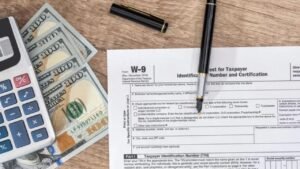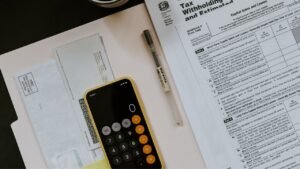For most of us, tax season is a stressful period of the year. You may feel stressed by seeing that you have to manage paperwork, calculations, and federal rules as the filing deadline approaches. The IRS has also reported that several taxpayers make common mistakes while filing their taxes yearly.

These common errors can cause your refund to be delayed and possibly result in a penalty. Learn about some common mistakes to avoid so that you can pay your taxes correctly. This article will guide you through these mistakes and provide helpful tips to guarantee a seamless tax filing procedure.
“Knowing what to look out for can help taxpayers be better prepared when they file their federal tax return,” the Internal Revenue Service said in a statement.
Also Read How to File Your Taxes Online: A Step-by-Step Guide for Beginners
How to File Your Taxes Online: A Step-by-Step Guide for Beginners
Contents
How Can Tax Filing Mistakes Impact Your Finances?
You can face serious issues if you make mistakes while filing taxes. Financially speaking, mistakes on your tax return may result in inaccurately estimated tax obligations. You may have to underpay or overpay the Internal Revenue Service due to these errors. These errors may result in:

- Interest and Penalties
- Audits
- Postponed Refunds
Common Tax Filing Errors
Now that you’ve learned a little about some of the possible effects of tax filing errors, let’s look at the most frequent errors—and how to prevent them!

1. Incorrect Filing Status
Filing with the wrong status can mean a big difference in your tax bill or refund. With every filing status, there are some regulations on who can use that status. Filing statuses include:
- Single
- Head of Household
- Married Filing Jointly
- Married Filing Separately
- Qualifying Surviving Spouse

“Certain filing statuses–like Head of Household–offer better tax brackets and a higher standard deduction than single status. Choosing the wrong filing status could cost you more in taxes,” says Joanne Burke, a certified public accountant and founder of Birch Street Financial Advisors.
Tip: Refer to resources such as the IRS’s Interactive Tax Assistant to make sure you’re selecting the proper status for your case.
2. Forgetting Tax Credits and Deductions
The majority of taxpaying citizens miss out on valuable tax credits and deductions solely because they have no idea they are qualified for them. Knowing what you are qualified for can guarantee that you maximize your tax return.
Make sure you sift through all possible deductions and credits, such as education expenses, medical expenses, and donations. These could include education credits, mortgage interest deduction, or business expenses.
“You can also miss out on valuable tax credits like the Earned Income Tax Credit and the Child and Dependent Care Credit, which can be costly,” says Joanne Burke.
3. Math Error
Math errors are one of the most common mistakes the IRS sees. “In 2024, some 2.7 million returns had math errors,” according to the IRS.
The agency said, from simple mistakes in addition and subtraction to difficult math when taking deductions. If the IRS finds that you owed more, though, it will probably require the extra money plus interest accrued since the due date of the return.
“Simple mathematical errors are one of the top reasons for IRS audits. Double-check all amounts you enter and use tax software like H&R Block that handles the calculations to minimize the risk of errors,” Flores says.
4. Missing or Inaccurate Information
It’s simple to forget basic facts such as income data or Social Security numbers. But these mistakes can delay your tax filing processing. Double-check that all personal data is right and complete—and written on the proper line of your form—to prevent unnecessary delays.
“One major impact is delayed processing and refunds. If critical information, such as income, filing status, or Social Security numbers, is entered incorrectly, the IRS may take additional time to review the return and resolve discrepancies, which could hold up any refund you’re expecting,” Burke says.
5. Filing Too Early or Too Late
Timing is critical when filing your taxes. Filing too hastily without proper documents leads to incomplete submissions, and delayed filing is met with penalties. Monitor all required forms and aim to file within the recommended timeframe.
“It’s great to be on top of your return, but make sure that you have received all necessary documents before filing your return. You’ll benefit by waiting to file until you obtain all the details you need to claim child care expenses, student loan interest, the premium tax credit, and other tax benefits,” says Alison Flores, manager with The Tax Institute at H&R Block.
6. Incorrect Direct Deposit Information
For individuals who anticipate a tax refund, the IRS promotes direct deposit. But wrong banking information can hold up the process. Double-check your account and routing numbers to be sure and get your refund on time.
Snapshot: Common Tax Filing Mistakes
| Mistake | Description |
| Incorrect Filing Status | An incorrect status may change your tax rate and your standard deduction. |
| Late Filing | Failure to meet a deadline can lead to penalties. |
| Inaccurate Income Details | Forgetting all income sources, such as gig work, can lead to an audit. |
| Missing Personal Information | Name, SSN, or bank information errors result in delayed processing. |
| Math Errors | Miscalculations are the most frequent, occurring most often on paper returns. |
| Incorrect Deductions or Credits | Taking improper credits or miscomputing credits can lead to errors. |
How Can You Avoid These Tax Filing Errors?
The easiest way to prevent these most frequent filing errors is to follow a few preventive steps. The steps are –
1. Collect All Needed Documents
You should collect all tax documents like tax receipts, 1099s, and W-2s together well ahead of time. You must also keep your records in order all year if you intend to itemize your deductions.
2. Hire a Tax Professional or Use Tax Software
You can also use tax preparation software or hire a tax expert to help you file your taxes properly. These professionals can provide individualized recommendations and an understanding of your specific situation. Whereas tax software will guide you through finding tax credits and deductions and avoiding any miscalculation errors.
3. Double-Check Your Return Carefully
You must double-check your information before submitting your tax return to avoid any errors. First, ensure that you have included the right personal information. Then check the calculations, deductions, and all your income carefully to ensure that they are correct.
4. File Electronically
Relative to paper filing, electronic filing is faster, more accurate, and less error-prone. Furthermore, it speeds up the refund approval process.
5. Retain Copies of Your Tax Return and Supporting Papers
Retain copies of your tax returns and supporting papers at all times. These papers are useful for future purposes and are demanded in case of any audit or discrepancies.
FAQs
What is the most common tax filing mistake?
The most common error is claiming improper Social Security numbers or making math errors on credits and deductions.
Can arithmetic errors on my return be adjusted?
Yes. The IRS will probably fix straightforward math errors and mail you a notice explaining the adjustment.
How many years do I need to maintain tax records?
Typically, retain records for three years, but certain documents must be retained for a longer period, such as seven years for claims of bad debt.
How do I get tax assistance?
You can use tax preparation software, employ the services of a tax professional, or use IRS resources and services.

